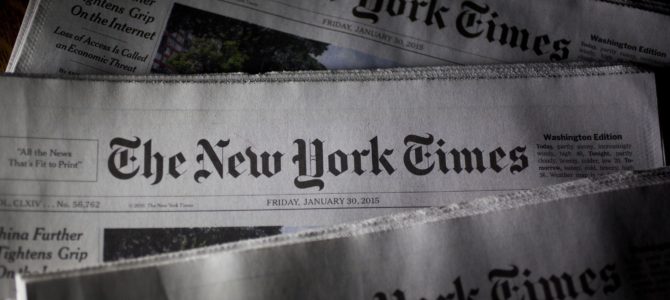
The New York Times centered a recent report on Jared Kushner’s “fumbling” volunteer task force around the account of Dr. Jeffrey Hendricks. Hendricks, however, came forward last week to say the story “did not fully reflect my experience” and the administration is “putting forth incredible efforts to assist our health care providers and our citizens.”
A senior administration official echoed Hendricks’s frustrations with the report, which were made in a statement to The Spectator. “It is a bit of a shame that the Times tried to frame what has been a really admirable attempt to source PPE around the globe at an extremely difficult time in a negative light just to score political points with its readers,” the official told The Federalist on Monday.
Kushner assembled the task force of roughly a dozen volunteers this spring to locate protective gear for medical workers combating the coronavirus pandemic. In a weekend interview with Fox Business, the senior advisor to President Trump pushed back on the story, saying it was “just not true.”
Hendricks, a South Carolina physician, attempted to connect the administration to vendors in China who could supply masks by the millions. As the Times put it, he “had longtime manufacturing contacts in China and a line on millions of masks from established suppliers.”
“When I offered them viable leads at viable prices from an approved vendor, they kept passing me down the line and made terrible deals instead,” Hendricks told the paper, which further reported that “his offer stalled” in the hands of the volunteer task force.
According to the Times, Hendricks’ “messages sometimes went unanswered and were passed from person to person, even though he provided the codes and filled out the forms the government required, and sent a picture of the masks to Ms. [Rachael] Baitel to prove that they were real.”
“After five weeks of somewhat frustrating efforts, I’m finally hopeful,” the Times quoted him saying on May 5, after learning a site visit could soon take place.
The Times zeroed in on Hendricks’ account to underscore a narrative of the task force as a clumsy group of incompetent kids, plagued by cronyism and bureaucratic inefficiency. Whether or not that’s accurate, Hendricks himself strongly disagrees. The doctor released a statement to The Spectator last week “clarify[ing]” his experience with the task force. Hendricks’ statement is excerpted in full below (emphasis added):
‘I read the article in the New York Times. There were some pieces that were true and some things that did not fully reflect my experience. To be fair to the volunteers, Rachel Baitel, and others, I should clarify my experience. Most importantly, we all need to recognize we are in an unprecedented situation with a global health crisis of almost incomprehensible magnitude. My experience with the volunteers was that they were kind, responsive, and tried to assist. I believe everybody is trying to manage the best way possible and with good intentions. There will be efforts that work, and efforts that are well intended, but do not. We can assess this going forward and make new recommendations accordingly. I believe that this administration is putting forth incredible efforts to assist our health care providers and our citizens. Of course, there will be frustrating aspects of it along the way, and yes, I experienced some of this. I expressed my frustration with slow communication that seemed to have stopped altogether, but also acknowledged the vetting process could take some time. Despite what at times felt like a bureaucratic process I finally received authorization for a site inspection on April 29, 2020, although this has not taken place as of yet.’
Curiously, the “acknowledgment” Hendricks says he made to the Times, conceding the vetting process would be lengthy, did not make it into the story. His characterization of the volunteers as “responsive” is also different from the Times’s characterization of the team, which was driven heavily by a whistleblower complaint first reported in the Washington Post. It’s telling that Hendricks released a statement outlining his disagreements with the article’s description of the team, and his own experiences with it.
There are competing perspectives on the task force included in both the Times and Post stories, although each article ultimately advances a narrative of incompetence. Hendricks’ decision to actively refute the Times’s characterization of his experience provides some useful evidence the paper’s angle was, at best, rather inflexible.









